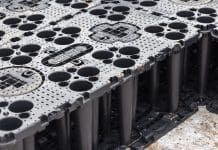Over the past three years, Valerie Owen OBE has led the British Board of Agrément through some seismic events in the construction industry. As she nears the end of her tenure, she talks to PBC Today about Hackitt, Brexit, value engineering, the rise of Modern Methods of Construction and her own future in a new role
Valerie Owen OBE is nearing the end of her three-year tenure as chair of construction products certification body the British Board of Agrément (BBA). She was the first woman to chair the BBA since it was founded more than 50 years ago, an appointment which reflects her seniority and stature within the construction industry.
Today, Valerie Owen is one of only two women in the UK to chair a construction company, an accolade acknowledged in 2015 with a Lifetime Achievement Award in the prestigious national Women in Construction awards. In 2016, the Confederation of British Industry recognised her as the ‘First Woman’ in the Built Environment Sector.
Owen is expert at juggling challenging roles – the tougher, the better. She was the only female director in European Asset Management at international real estate consultants Jones Lang LaSalle in her earlier career and is among the most qualified women in property in the world (she holds chartered status as an architect, town planner, development surveyor and an environmentalist).
She has also championed the education of girls and women from disadvantaged immigrant communities through Girlguiding UK and was awarded an OBE in 2001.
She is happiest when breaking new ground, which is just as well, given the transformational events and issues that have dominated the construction sector during her term of office at the BBA.
As her chairmanship nears an end, how does she view the BBA’s position and progress on key priorities?
“The Grenfell tragedy exposed some real shortcomings in the way buildings are designed, procured, constructed, maintained and managed in the UK,” Owen says.
“The BBA is keen to see improvements in all these areas, which is why we collaborated with Local Authority Building Control (LABC) on the 100% Hackitt initiative, which was launched last autumn and subsequently taken up by the government, to help drive beneficial change across the development and construction sectors.”
A passionate advocate on health and safety matters in construction, Owen firmly believes the BBA plays an important role when providing technically excellent reassurance services for construction products.
“By encouraging the safe development of innovative solutions in the built environment, the BBA can help drive improvements in a whole range of important areas, from building safety to carbon reduction; from product quality to reduced costs in building energy and use,” she says.
“We are currently championing improvements in construction procurement practices. It cannot be right that value engineering, which often takes place after a contract has been awarded, can sometimes result in lower levels of specification, as well as in lower project costs. When procuring and building projects, commissioning clients should put greater emphasis on whole life value than construction costs.”
Owen has a good grasp of construction issues, having pursued a portfolio career combining consultancy with a broad range of non-executive and ministerial appointments, which have involved her in some very large development and infrastructure projects. These include the redevelopment of Covent Garden Market at Nine Elms, the regeneration of the Western Docks at the Port of Dover, the Thames Tideway super sewer, the redevelopment of Barts Health NHS Trust hospitals in Whitechapel (Royal London) and the City (St Bartholomew’s), and management of billions of pounds of MoD assets on behalf of the Army, Royal Navy and Royal Air Force.
This experience has given her tremendous insight into the construction sector in recent years and, although it is too soon to assess the full impact of Brexit, Owen says the industry is already feeling its influence.
“The low value of the pound increases supply chain costs for imported products and materials and squeezes project returns. Plus, given migrants make up around 50% of labour in the London market, it also affects labour supply in an industry that is already characterised by ageing demographics, capacity and capability issues,” she says.
“Sometimes procurement practices can compound these problems when they result in adversarial pricing, low margins and financial fragility.”
Despite this, she sees huge opportunities both for the sector and the BBA owing to the pace and nature of technical change, including greater digitisation and Modern Methods of Construction in manufacturing and prefabrication. She believes these changes will help drive improvements in quality and safety, as well as deliver efficiencies through quicker delivery times and reduced labour costs.
Under her leadership, the BBA is responding to these opportunities by developing new products and services that meet new market demands and, given its activities span assessment, test, inspection and certification right across the construction sector, it is well placed to do this.
In 2017, Owen was awarded a prestigious National Non-executive Director of the Year award and feels her non-exec skills and experience have served the BBA well. As she completes her term as chair, Owen is confident the organisation is in a stronger position than when she joined it.
Over the last three years, she has refreshed the BBA board to give it a more commercial slant while still holding true to the values, ethos and commitment to the public good that underpin its reputation and brand.
She said: “In many ways, both Brexit and increased competition for certification business present opportunities for a high performing board because the greatest added value of non-executives is their strategic oversight, impartiality and independence of thought, wisdom and sound judgment around risk management, governance and transferrable, wider business experiences.”
The organisation has developed a clear strategy to grow sustainably year-on-year and enhanced its performance management with a new committee structure and business monitoring tools, including Key Performance Indicators (KPIs). These not only help provide clear oversight of business performance but also help board members to better prioritise investment need and manage risk around delivering the business plan.
Owen is confident the BBA can grow: “There are lots of opportunities for business development; for example, we have a renowned test facility in Watford that we tend to use to support our construction products certification work only. But there is no reason why we cannot provide offsite test services for an entirely different customer base.”
In a response to Brexit, the board has established a company in Ireland – BBA (EU) – to safeguard its existing client business and grow market share across Europe.
In a response to greater competition, the board has created a fighting fund, which it is reinvesting in digital transformation projects to enhance processes and procedures. This, coupled with additional investment in its people, will help drive cultural change and improve levels of customer service and response times. The board has also reviewed its governance structure, in order to help grow and diversify its business.
In a response to the Grenfell tragedy, the board reviewed its mission, vision and values and reaffirmed its commitment to investing in research and development and to providing high quality technical services while remaining completely independent and impartial.
Owen is pleased to be leaving the BBA in good shape and will be embarking on a new challenge later this year when, under succession, she will become Master of the Worshipful Company of Chartered Architects (WCCA), a livery company in the City of London.
“Apprenticeships will be the theme of my year of office,” she said.
“The RIBA has been working with a trailblazer group of practices for a couple of years now and last September began promoting a professional apprenticeship in architecture. Apprenticeships fit well with the WCCA’s charitable focus on education. They reflect the historic purpose of the London Guilds; supporting apprenticeships is a traditional role for livery companies that can be traced back centuries.”
Valerie Owen thinks university fees make courses in architecture “less accessible” to the widest range of students because the course is long, typically five years, making it one of the costliest to undertake. Apprenticeships in architecture excite her enormously for cogent reasons.
In 2009, she was appointed a Cabinet Office ambassador to promote equality and diversity in public appointments and is particularly keen to help attract more girls and women to an architectural career.
“Apprenticeships will have really positive implications for architectural education, practice involvement in education and training, equality, diversity and inclusion in the profession because they will help increase access to the profession from a wider talent pool,” she says.
As urban topography continues to evolve, often dramatically in the case of the capital, Valerie Owen for one may well be able to gaze across the architectural landscape in the knowledge that she has played a key role in shaping its development on several levels.
The BBA has announced Andrew Kitchingman as its new chairman. He is a chartered accountant and corporate financier who holds a number of non-executive positions across a broad spectrum of businesses, including construction-related and charitable.
British Board of Agrément
Tel: +44 (0)1923 665300
Twitter: @bbaguru














